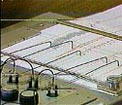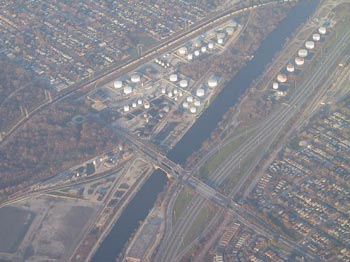|
There are many issues on the minds of politicians and voters these days: terrorism and military operations overseas, the economy and jobs, health care. Environmental issues do not seem to rank very high on the Concern-O-Meter, but to a large extent, that is
 a self-fulfilling prophesy due to the underreporting of environmental problems by the mainstream corporate media. But that aside, even when politicians do get around to discussing important environmental issues with us—the air that we breathe, the water we drink, the food we eat, and the natural world we live in with the rest of the earth's creatures—the falsehoods fly.
a self-fulfilling prophesy due to the underreporting of environmental problems by the mainstream corporate media. But that aside, even when politicians do get around to discussing important environmental issues with us—the air that we breathe, the water we drink, the food we eat, and the natural world we live in with the rest of the earth's creatures—the falsehoods fly.
In some cases, a politician's rhetoric may be heart-felt, but in other cases it may merely be spin, covering up for the fact that the politician is willing to sacrifice what is good for the environment and the general populace for a narrower benefit, such as the interests of his big campaign contributors. But there is a little-talked-about reason that politicians sometimes lie to us about environmental issues: We can't handle the truth.
Yes, those are the famous words uttered by Jack Nicholson's Colonel Jessup in the movie "A Few Good Men." The concept was that we, the general public, are either unable to stomach certain aspects of reality or are happier being blissfully ignorant. In the case of the environment, most politicians don't want to address issues of pollution, global warming, the deteriorating web of life, the growing piles of nuclear waste, farm-animal welfare, invasive species, habitat loss, species extinction, and ever-increasing levels of human population on the planet. But why not?
Each politician may have his or her reasons for stating untruths or lying by omission. Many may see the real solutions to some environmental issues as too complicated to
 explain to us unwashed masses, or they may view the solutions as striking at the heart of the American way of life and, therefore, political suicide to bring up.
explain to us unwashed masses, or they may view the solutions as striking at the heart of the American way of life and, therefore, political suicide to bring up.
There is some truth to both of these notions. The facets of our existence that are wasteful or unsustainable are indeed threatened by sensible solutions. But the proper explanation of issues and solutions can't easily be distilled down to 60-second sound bites, and politicians know that's about all the attention they can expect from us in these days of hyper-busy lives and hair-trigger channel changing. If we are disengaged as voters, we can't really expect politicians to talk to us as though we were paying close attention.
For many in America, the most sought-after living arrangement is to have a nice house with a nice lawn and plenty of breathing room between us and our nearest nutty neighbor. Few think about the fact that every time a new housing development goes in on previously undeveloped land, we turn a natural ecosystem full of native plants and animals into an area that is usually replanted with a limited number of non-native species and becomes unsuitable for the majority of its previous flora and fauna. The onward march of development continues to chew up more and more farm land, meadows, and forests. Where will it all end? Is there a point of maximum development at which the global ecosystem that sustains us becomes so altered that it goes into freak-out mode, threatening all life? These are apt questions, but you rarely hear politicians talk about them.
Let's take a quick detour for a reminder about population growth, which is a big factor not only in suburban sprawl but also in energy use and global warming. Ever-increasing numbers of people on the planet will need more and more land for housing, and more land for roads to get from their homes to jobs and shopping. They will also require more land and energy for production and distribution food, clothes, and other goods, and they will need more energy to light their homes and fuel their vehicles. Failure to address population growth will make addressing the sprawl issue and the US role in climate change much, much tougher.

Do your elected officials address sprawl,
or is it full speed ahead on development projects?
If we don't want to see all our green spaces eaten up by development and we don't all want to start living in high-rises and we don't want to sink ever deeper into the fossil-fuel energy hole, the only solution is to get serious about population growth. But it's a rare politician who will step up and frame the issue in these stark terms, if they are willing to discuss it at all. Additionally, many politicians promote constant increases in development because they (falsely) believe it is the only way to keep the local economy strong or because developers are among their campaign contributors. (See the Grinning Planet article Solutions to the Problem of US Population Growth for further info on this.)
We, as a society, have hard choices to make. It would be nice if our politicians would tell us the truth, explain the tough issues, and give us some choices for how to solve the problems. But until there is a grassroots movement supporting discussion of difficult issues—until the supporting winds blow hard enough for politicians with their fingers in the wind to sense the need to do it—most politicians will continue to leave the tough issues in the Cone of Silence. Until we demonstrate that we can handle the truth, we can expect our politicians to keep lying to us.
There will always be some politicians who will lie more than others and some who come very close to telling us the truth. It's easy enough to identify these two types: The lying politicians will usually be saying things that feel comfortable and require no effort on our part; the truth-telling politicians will usually be saying things we'd rather not hear and prefer not to think about.
And now, back to the script we're writing for a new TV-series pilot: "Survivor: 15 Senators on Alcatraz"…
Resources:
More articles and resources on....
Get Grinning Planet free via email
|


